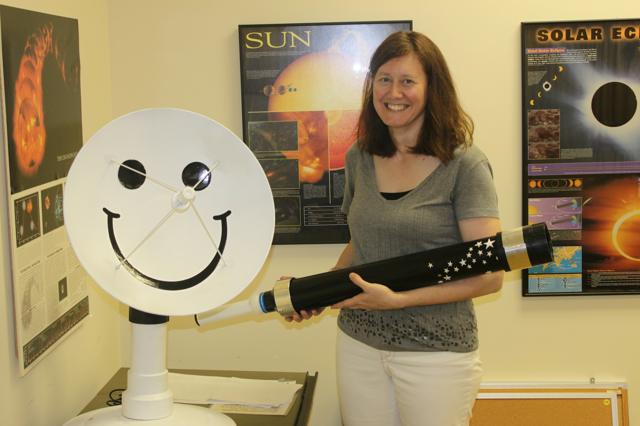The search for water in the universe — and, by extension, for extraterrestrial life — was the subject of “Astrobiology: Where Are We Searching and What Are We Looking For?” a May 13 program at the Pisgah Astronomical Research Institute near Brevard. The program included a tour of the campus and a chance to look through PARI’s powerful telescopes.
The presentation by Christi Whitworth, the nonprofit’s education director, was part of the monthly Evenings at PARI series. “Some of the most sophisticated research currently being conducted involves astrobiology,” she notes, citing astronomers’ attempts to detect water in the universe and thus identify planets outside our solar system that might harbor life. Tools include the Drake equation (an estimate of the number of detectable extraterrestrial civilizations in the Milky Way) and looking for extremophiles, “previously unknown organisms found right here on Earth — like in the cracks and crevices … deep under water,” Whitworth explains. “This reminds us that H2O is a primary factor for determining where other organisms might live outside our solar system. We’re looking at well over 450 of those [celestial] objects now … that are in that narrow range beyond the surface of their star that they could potentially have liquid or ice water on their surface. We’re building a project path … choosing a place to look for life.”
Evenings at PARI are held the second Friday of the month, starting at 7 p.m.; reservations (required) will be accepted until 3 p.m. the day of the event. Cost: $20 adults, $15 seniors/military, $10 children under 14. Register online at pari.edu or call (828) 862-5554.
Meanwhile, back at the ranch…
Western North Carolina farmers in counties with some of the state’s highest unemployment and poverty rates may be eligible for free renewable-energy installations through a demonstration project supported by a roughly $150,000 grant from the N.C. Green Business Fund. Two Asheville businesses, Community Development Specialists and Green Brothers Solar, will install wind turbines and solar hot-water systems on 10 small farms under the N.C. Department of Commerce’s 21st Century Communities program. Farms in Alexander, Burke, Caldwell, Cherokee, Clay, Cleveland, Graham, Mitchell, Rutherford and Yancey counties can apply. Meanwhile, local high-school and community-college students will get hands-on training in installing these systems.
The installations are expected to generate more than 28,000 kilowatt-hour of renewable energy annually, saving each farm at least $320 per year for up to 20 years (at least $6,400 all told). In return, participating farms agree to: help collect data on renewable-energy use, make the system available for public viewing (by appointment) for a year, and be part of a regional promotional effort. Applications are being accepted through Monday, May 30.
For more information or to apply, contact Sara Day Evans (sevans@nccommerce.com or 828-989-3799).
$ave energy, $ave money
A bill co-sponsored by Reps. Susan Fisher and Patsy Keever of Asheville would establish an independent fund to improve energy efficiency in homes and public buildings across the state. HB 874 would create a revolving loan fund, available to residents of all income levels, that could help pay for weatherizing several thousand homes per year. Supporters say it will maintain jobs and skills developed over the past two years using federal recovery funds that will no longer be available.
"This bill is the best tool we have to prevent costly electricity-rate hikes that would pay for new power plant construction," says Rep. Paul Luebke of Durham, the lead sponsor.
A greener student body
Montreat College was one of six winners in a National Wildlife Federation competition promoting environmental stewardship at U.S. colleges and universities.
Last year, Seeds, a student environmental group, launched the Residence Energy Challenge as part of a commitment to improve energy efficiency across the Montreat campus. Residents reduced their energy consumption by 19.5 percent and prevented 3.7 tons of carbon dioxide from being released into the atmosphere, while learning a variety of energy-saving techniques.
The Seeds team has also established a “community farm,” affectionately dubbed The Garden of Eatin’, to provide more local produce on campus. “If each American ate locally one meal per week, the nation would save 1.1 million barrels of oil per week,” says Andrea Thompson, the group’s co-president. “The Garden exists to help build community, to connect people to each other and the food they eat. It’s an easy, fun and inexpensive way to reduce our carbon footprint, stimulate the local economy, and educate the student body about healthy eating.”
— Direct your local environmental news to Susan Andrew (251-1333, ext. 153, or sandrew@mountainx.com).




Before you comment
The comments section is here to provide a platform for civil dialogue on the issues we face together as a local community. Xpress is committed to offering this platform for all voices, but when the tone of the discussion gets nasty or strays off topic, we believe many people choose not to participate. Xpress editors are determined to moderate comments to ensure a constructive interchange is maintained. All comments judged not to be in keeping with the spirit of civil discourse will be removed and repeat violators will be banned. See here for our terms of service. Thank you for being part of this effort to promote respectful discussion.